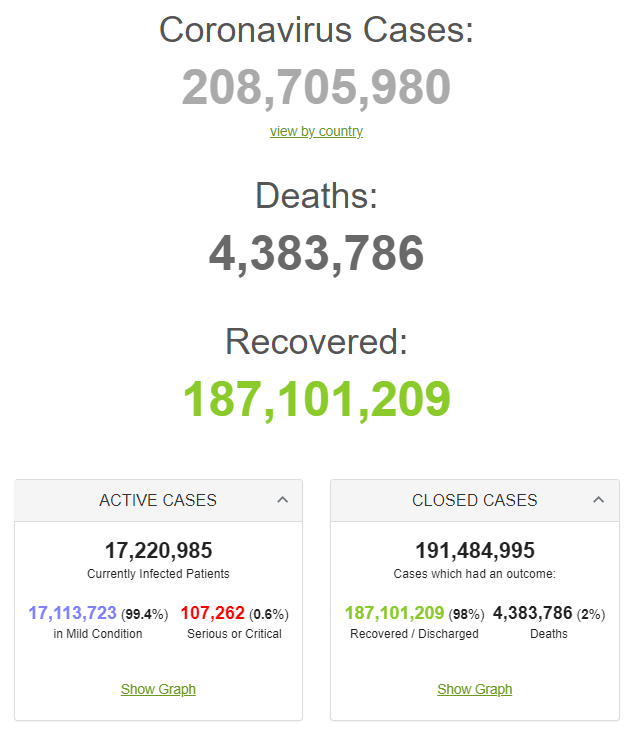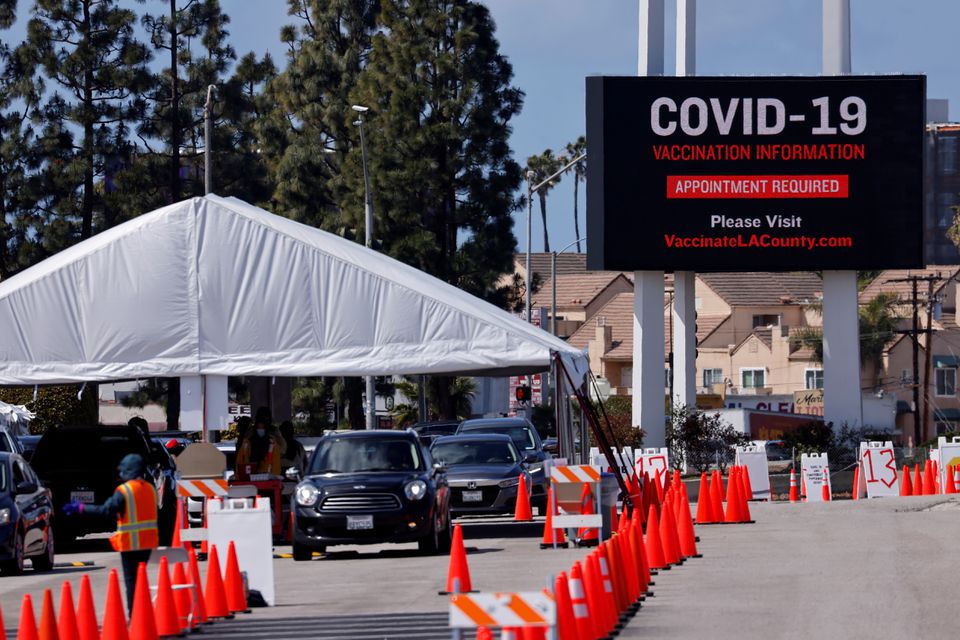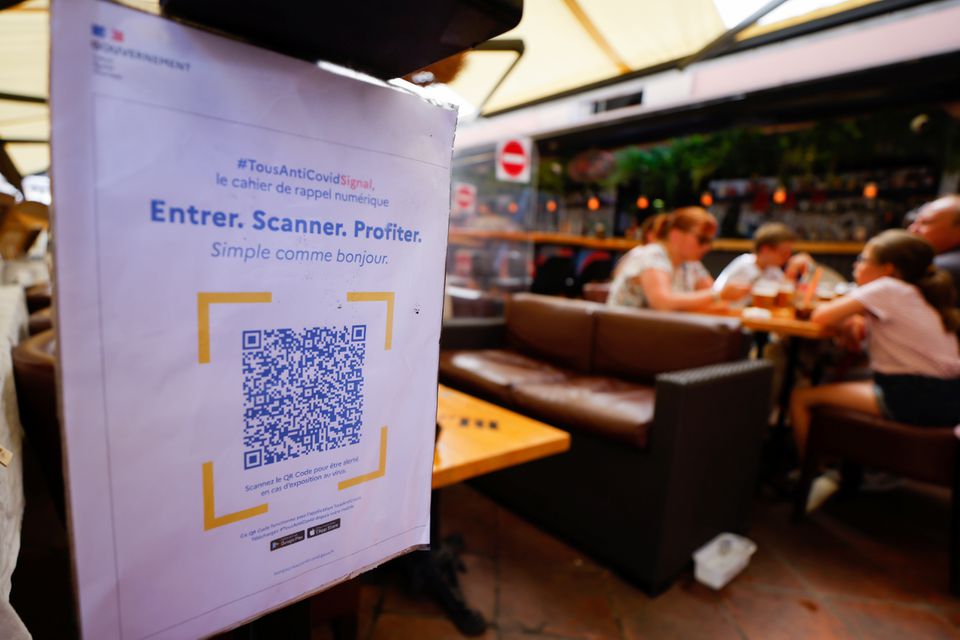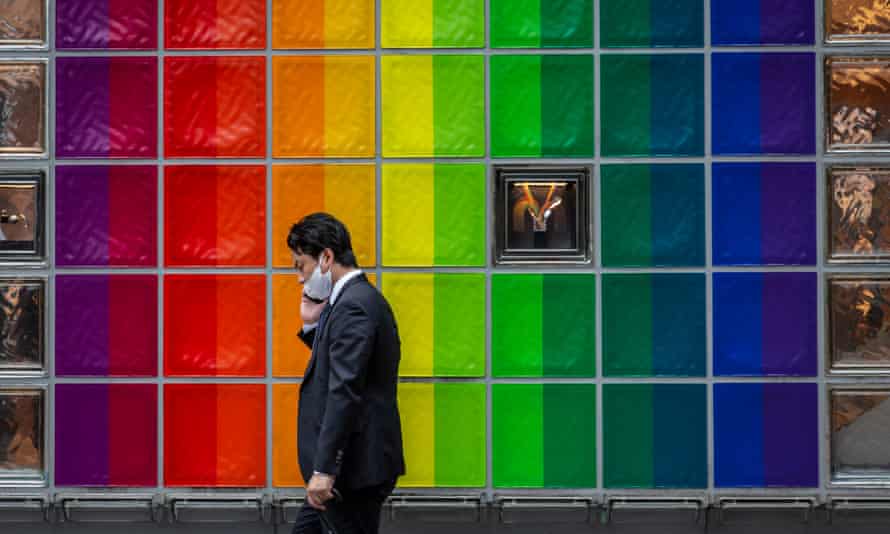
 i_need_contribute
i_need_contribute


|
Country, |
Total |
New |
Total |
|
World |
208,668,740 |
+526,830 |
4,383,147 |
|
37,736,986 |
+103,697 |
638,798 |
|
|
32,249,900 |
+24,725 |
432,112 |
|
|
20,378,986 |
+14,887 |
569,581 |
|
|
6,621,601 |
+20,765 |
171,305 |
|
|
6,476,864 |
+5,829 |
112,753 |
|
|
6,295,613 |
+28,438 |
130,979 |
|
|
6,096,816 |
+18,163 |
53,324 |
|
|
5,088,271 |
+3,636 |
109,105 |
|
|
4,870,922 |
+3,161 |
123,580 |
|
|
4,719,266 |
+8,576 |
82,595 |
|
|
4,467,015 |
+41,194 |
98,483 |
|
|
4,444,338 |
+3,674 |
128,456 |
|
|
3,871,738 |
+17,384 |
118,833 |
|
|
3,831,806 |
+3,543 |
92,384 |
|
|
3,101,266 |
+9,295 |
248,380 |
|
|
2,885,461 |
+128 |
75,299 |
|
|
2,613,569 |
+7,983 |
77,440 |
|
|
2,266,329 |
+417 |
53,269 |
|
|
2,134,365 |
+553 |
197,487 |
|
|
1,904,128 |
+2,228 |
17,915 |
|
|
1,784,594 |
+8,830 |
19,740 |
|
|
1,755,846 |
+14,610 |
30,366 |
|
|
1,676,308 |
+77 |
30,376 |
|
|
1,629,932 |
+740 |
36,420 |
|
|
1,455,971 |
+4,002 |
26,704 |
|
|
1,425,861 |
+6,959 |
24,349 |
|
|
1,424,639 |
+19,740 |
12,784 |
|
|
1,153,459 |
+1,770 |
25,296 |
|
|
1,144,546 |
+17,836 |
15,408 |
|
|
1,102,079 |
+3,669 |
24,478 |
|
|
1,087,509 |
+286 |
34,353 |
|
|
1,004,470 |
+1,135 |
17,573 |
|
|
949,535 |
+8,730 |
6,687 |
|
|
928,314 |
+21,157 |
7,734 |
|
|
810,504 |
+188 |
30,041 |
|
|
784,631 |
+1,183 |
10,222 |
|
|
763,353 |
+3,897 |
11,119 |
|
|
734,838 |
+2,566 |
10,327 |
|
|
733,332 |
+1,288 |
7,174 |
|
|
702,885 |
+1,109 |
2,003 |
|
|
694,476 |
+7,217 |
7,652 |
|
|
669,506 |
+774 |
10,757 |
|
|
625,688 |
+1,748 |
21,905 |
|
|
583,718 |
+706 |
7,982 |
|
|
539,337 |
+2,212 |
13,204 |
|
|
539,129 |
+604 |
8,419 |
|
|
526,837 |
+9,169 |
4,088 |
|
|
484,254 |
+2,676 |
6,436 |
|
|
482,428 |
+297 |
18,185 |
|
|
462,197 |
+894 |
3,613 |
|
|
456,842 |
+147 |
15,455 |
|
|
448,268 |
+444 |
6,962 |
|
|
434,535 |
+1,301 |
18,376 |
|
|
432,149 |
+878 |
5,255 |
|
|
413,797 |
+757 |
11,189 |
|
|
406,883 |
+343 |
2,393 |
|
|
393,536 |
+7 |
12,544 |
|
|
383,387 |
+95 |
6,004 |
|
|
369,853 |
+1,851 |
5,170 |
|
|
367,068 |
+46 |
8,285 |
|
|
362,074 |
+4,334 |
6,263 |
|
|
356,985 |
+2,706 |
13,445 |
|
|
331,736 |
+959 |
2,560 |
|
|
326,188 |
+1,441 |
5,059 |
|
|
321,031 |
+620 |
3,625 |
|
|
319,955 |
+861 |
3,815 |
|
|
318,504 |
+1,044 |
8,419 |
|
|
300,408 |
+214 |
3,999 |
|
|
290,206 |
+400 |
4,454 |
|
|
289,962 |
+688 |
4,489 |
|
|
285,465 |
+107 |
16,625 |
|
|
284,618 |
+2,688 |
3,933 |
|
|
283,696 |
+8,652 |
6,141 |
|
|
271,025 |
+106 |
1,384 |
|
|
262,244 |
+200 |
6,313 |
|
|
261,484 |
+56 |
4,433 |
|
|
234,814 |
+256 |
4,702 |
|
|
229,428 |
+260 |
601 |
|
|
225,481 |
+1,553 |
2,167 |
|
|
221,406 |
+679 |
4,350 |
|
|
202,429 |
+168 |
3,538 |
|
|
187,968 |
+710 |
4,830 |
|
|
183,652 |
+1,061 |
880 |
|
|
183,087 |
+584 |
2,223 |
|
|
172,327 |
+237 |
2,451 |
|
|
145,014 |
+530 |
809 |
|
|
143,918 |
+877 |
981 |
|
|
142,380 |
+5,622 |
2,043 |
|
|
140,171 |
+49 |
2,563 |
|
|
137,156 |
+164 |
1,279 |
|
|
136,147 |
+200 |
2,466 |
|
|
122,545 |
+76 |
3,285 |
|
|
109,253 |
+381 |
461 |
|
|
26,641 |
+48 |
685 |
|
|
13,406 |
+56 |
121 |
Retrieved from:https://www.worldometers.info/coronavirus/

A large vaccination site is shown as people with preexisting health conditions are granted access to a vaccination during the outbreak of the coronavirus disease (COVID-19) in Inglewood, California, U.S., March 15, 2021. REUTERS/Mike Blake
The Biden administration plans to begin administering COVID-19 booster shots to Americans as early as mid or late September, pending authorization from the U.S. Food and Drug Administration, a source familiar with the discussions told Reuters late on Monday.
Health officials in U.S. President Joe Biden's administration gathered round the view that most people should get a booster shot eight months after they completed their initial vaccination, the source said.
According to the New York Times, which earlier reported the development, officials are planning to announce the administration's decision as early as this week, with the first boosters likely to go to nursing home residents and health care workers, followed by other older people.
Last week, U.S regulators authorized a third dose of COVID-19 vaccines by Pfizer Inc (PFE.N) and its German partner BioNTech SE (22UAy.DE) and Moderna Inc (MRNA.O) for people with compromised immune systems who are likely to have weaker protection from the two-dose regimens. read more
The administration's goal is to let those who received the Pfizer-BioNTech or Moderna vaccines know that they will need additional protection against the Delta variant of the coronavirus, NYT said.
The newspaper added that officials also expect recipients of the vaccine from Johnson & Johnson (JNJ.N), which was authorized as a one-dose regimen, will also require an additional dose.
Reporting by Steve Holland in Washington and Bhargav Acharya in Bengaluru; Editing by Christian Schmollinger
Retrieved from:https://www.reuters.com/world/us/us-advise-covid-19-booster-shots-8-months-after-vaccination-nyt-2021-08-17/

A coronavirus disease (COVID-19) health pass poster reading "Enter, Scan, Enjoy" is seen at a restaurant as France brings in tougher restrictions where a proof of immunity will be required to access most public spaces and to travel by inter-city train in Nice, France, August 9, 2021. REUTERS/Eric Gaillard
Shopping malls in Paris and large parts of France had to ask customers to show a health pass on Monday, as the government increased pressure on people to get vaccinated against COVID-19.
The requirement to show proof of vaccination or a negative test applies to all malls with a surface area of more than 20,000 square metres in regions where the COVID-19 incidence rate is higher than 200 cases per 100,000 citizens per week.
This will mainly affect retail centres in the south of the country - which has a higher incidence rate - but following a regional prefecture decision over the weekend, the measure will also apply to malls and department stores in Paris, including tourist magnets Galeries Lafayette and Printemps.
Daily new infections have risen from a seven-day average of less than 2,000 at the end of June to nearly 24,000.
Most shoppers on Monday showed their health pass willingly, seeing it as a minor hassle that will allow a resumption of normal life.
"Unfortunately, we don't have many other options at this point, so I don't mind," said Parisian pensioner Frederic Gaide in front of the Printemps department store.
From this week, police will also get tougher enforcing the use of the health pass in restaurants, trains and indoor public spaces, after being lenient when it was first introduced last week.
While there were few reports of customers trying to circumvent the rule, some restaurant owners complained about time lost as customers tried to find their health pass.
"It takes time to unlock the phone, to find the application, to open it and to find the QR code. The scanning part works very well, but every step before that takes time, " said Ewa Fontaine at Paris restaurant Le Mesturet.
Retrieved from:https://www.reuters.com/world/europe/french-shopping-malls-require-covid-19-health-pass-2021-08-16/
By Renju Jose and Colin Packham
COVID-19 cases are set to "rise substantially" in Sydney in the coming weeks despite a prolonged lockdown, authorities said on Tuesday, warning soaring infections have already put hospitals under enormous strain.
Australia, once a world leader in curtailing COVID-19, is struggling to suppress a third wave of infections driven by the highly infectious Delta variant despite locking down more than half its population.
New South Wales (NSW) state, whose capital Sydney is the epicentre of the latest outbreak, reported 452 cases in the past 24 hours, the third-biggest one-day jump, and one new death.
"We envisage that case numbers in the next two or three weeks will bounce around and are likely to rise substantially," NSW Premier Gladys Berejiklian told reporters.
Sydney has already toughened restrictions, including setting up roadblocks in parts of the city, and has hiked fines amid reports of people flouting strict stay-at-home orders.
Economists fear the lockdowns may drive the country's A$2 trillion ($1.5 trillion) economy into a second recession in as many years, although Australia's central bank stands ready to take policy action, minutes from its August meeting showed on Tuesday. read more
In Sydney's south, 80 medical staff were forced into isolation at a local hospital after several cases of COVID-19 were found in an oncology ward, NSW Health Minister Brad Hazzard said, noting reports of ambulances queuing to access care in the city's west.
"There's no question that the hospital system is under enormous pressure across New South Wales," Hazzard said.
COVID-19 SPREADS
As the virus spreads to regional centres across NSW, a case was detected as far away as Broken Hill, a mining town more than 900 km (560 miles) northwest of Sydney deep in Australia's outback, raising fears of wider outbreaks.
The country is racing to speed up its sluggish vaccination rollout, with only about 26% of Australians fully vaccinated.
In Melbourne, the capital of Victoria state, 24 new local cases were detected on Tuesday, the first day after officials reinstated a night curfew and extended a hard lockdown until Sept. 2. Twenty-two cases were reported on Monday.
Australia's capital, Canberra reported 17 new locally acquired COVID-19 cases and authorities warned infections would likely rise in the coming days.
Despite the recent Delta outbreaks, Australia's coronavirus numbers are well below than many other countries in the developed world, with just over 40,000 cases and 967 deaths, but its vaccination figures are among the lowest.
A total of 57 people, most of them unvaccinated, have died in the latest outbreak in Sydney since July 11. There were no COVID-related deaths in Australia during 2021 until then.
Officials have been procuring emergency vaccine supplies from abroad and expect the pace of inoculations to pick up once more supplies arrive from October.
Retrieved from:https://www.reuters.com/world/asia-pacific/australias-victoria-reports-slight-rise-local-covid-19-cases-2021-08-16/

Tokyo has struggled to contain the virus despite a low infection rate at the outset of the Covid pandemic.Photograph: Getty
Japan’s economy recovered strongly in the second quarter to join the turnaround seen across G7 countries as the easing of lockdown restrictions sent consumers rushing to the shops.
Beating the expectations of City analysts, the world’s third largest economy also capitalised on global trade’s return to health with a surge in exports.
After a 0.9% drop in the first quarter, economic output expanded 0.3% in the second quarter, or by 1.3% using the annualised calculation that is more commonly cited by Tokyo. Analysts had expected the annualised growth to be only 0.7%.
However, a state of emergency imposed in the final days of the Olympic summer games to tackle the Delta variant and a broader slowdown in Chinaand the US is expected to dampen momentum in the third quarter.
“There’s not much to be optimistic on the outlook, with a spike in infections heightening the chance of stricter curbs on activity,” said Yoshiki Shinke, the chief economist at Dai-ichi Life Research Institute.
“Japan’s economy stagnated in the first half of this year and there’s a risk of a contraction in July-September. Any clear rebound in growth will have to wait until year-end.”
The second quarter rebound was also more modest than seen in the US, where GDP growth leapt 6.5% on an annualised basis in the second quarter.
The 19-member eurozone reported a 2% increase in GDP in the second quarter while the UK, which suffered one of the biggest pandemic-induced slumps during 2020, enjoyed a 4.8% increase in GDP.
After a low infection rate at the outset of the Covid outbreak, Tokyo has struggled to contain the pandemic and in more recent times has experienced a backlash by households against further restrictions. The latest state of emergency is the country’s third since March.
The economy minister, Yasutoshi Nishimura, said: “I have very mixed feelings about this GDP result. It shows that households’ consumption appetite is very strong despite the state of emergency curbs.
“Our priority is to prevent the spread of the virus. It’s very bad for the economy for this situation to drag on.”
A record number of gold medals for Japan in the Tokyo Olympics was unlikely to have boosted consumption, analysts said, after the games were held behind closed doors in the two weeks to 8 August.
Takeshi Minami, the chief economist at Norinchukin Research Institute, described the second-quarter performance as weak, after a low vaccination rate restricted an even larger bounce-back in consumer spending.
A surge in Delta variant cases in Asia has caused supply chain disruptions for some Japanese manufacturers, which could weigh on factory output and add to gloom for an already fragile recovery.
Retrieved from:https://www.theguardian.com/world/2021/aug/16/japan-economy-covid-restrictions-ease-economic-output
By Rebecca Robbins and Benjamin Mueller

A health care worker receiving the Johnson & Johnson vaccine at the Chris Hani Baragwanath Academic Hospital in Soweto, South Africa, earlier this year.Credit...Siphiwe Sibeko/Reuters
While many African nations remain desperately short of vaccine supplies, Johnson & Johnson has been exporting to Europe millions of doses that were bottled and packaged in South Africa, according to executives at Johnson & Johnson and the South African manufacturer, Aspen Pharmacare, as well as South African government export records reviewed by The New York Times.
South Africa has yet to receive the overwhelming majority of the 31 million vaccine doses it has ordered from Johnson & Johnson. The country has administered only about two million Johnson & Johnson shots so far. That is a major reason that fewer than 7 percent of South Africans are fully vaccinated — and that the country has been devastated by the Delta variant.
“It’s like a country is making food for the world, and sees its food being shipped off to high-resource settings while its citizens starve,” said Dr. Glenda Gray, a South African scientist who helped lead Johnson & Johnson’s clinical trial there.
Many Western countries have kept domestically manufactured vaccine doses for themselves. That wasn’t possible in South Africa because of an unusual stipulation in the contract the government signed this year with Johnson & Johnson. The confidential contract, reviewed by The Times, required South Africa to waive its right to impose export restrictions on the company’s vaccine doses.
Popo Maja, a spokesman for the South African health ministry, said the government was not happy with the contract terms but lacked the leverage to refuse them. “The government was not given any choice,” he said in a statement. “Sign contract, or no vaccine.”

Prime Minister Muhyiddin Yassin of Malaysia in Kuala Lumpur, the capital, on Monday. He will continue as interim premier until a successor is appointed.Credit...FL Wong/Associated Press
Battered by public anger over the Malaysian government’s handling of the coronavirus and acknowledging he had lost the support of lawmakers, Prime Minister Muhyiddin Yassin and his entire cabinet resigned on Monday, signaling an end to a tumultuous 17-month reign.
For now, Mr. Muhyiddin will continue to steer the Southeast Asian country through its worst wave of the virus yet, as he will stay on as interim premier until a successor is appointed. The king, Sultan Abdullah Sultan Ahmad Shah, said that the country would not hold an election during the pandemic, leaving him to appoint the next leader, according to Reuters.
The resignations plunged Malaysia even deeper into political turmoil while it contends with one of the world’s worst surges of the virus. The nation of about 32 million people has averaged more than 20,000 cases per day in the last 14 days, and just 33 percent of the population is fully vaccinated, according to a New York Times database. The total death toll from the pandemic in the country is at least 12,510.
Mr. Muhyiddin pledged in a nationally televised address that the entire population would be vaccinated by the end of October, according to The Straits Times.
He also said that he accepted he had lost political support. “I will not conspire with kleptocrats, or interfere with the judiciary or turn my back on the Constitution to stay in power,” he said.
Mr. Muhyiddin assumed power in March 2020 when Mahathir Mohamad, 94, was ousted two years after he had been voted in as prime minister. A veteran nationalist politician, Mr. Muhyiddin was aligned with a scandal-tainted governing coalition that had dominated the country for more than 60 years before Mr. Mahathir’s election success.
Taking over with a thin majority as the coronavirus crisis began to roar, Mr. Muhyiddin used the pandemic to limit the ability of opponents to organize and challenge his power. But calls for his resignation gathered force as the country issued multiple lockdown orders, botched its vaccine rollout and endured widespread hunger.
Retrieved from: https://www.nytimes.com/2021/08/16/world/asia/Muhyiddin-Yassin-resigns.html
By Eshe Nelson

Visitors to the Isle of Wight can walk the 68 miles of coastline.Credit...Alexander Ingram for The New York Times
For the second year running, a hallowed rite for millions of people in Britain — decamping to the warmer climate of the Mediterranean — has been disrupted by the pandemic. The number of flights in and out of Britain are half their 2019 levels.
Instead, they are taking vacations closer to home.
This year, the Isle of Wight, a small island off the south coast of England, has lured even more visitors to its sandy beaches, coastal walks and arcades. But pandemic restrictions, staff shortages and the often uncooperative British weather have presented challenges to visitors and business owners this season.
Like many popular British vacation spots, such as Cornwall and the Lake District National Park, the Isle of Wight is suffering from a shortage of workers, especially in hotels and restaurants. One problem is that many have had to self-isolate for 10 days after being pinged on the country’s coronavirus tracing app.
And many workers, seeking more secure work, have taken jobs in other sectors. Brexit hasn’t helped — the pool of European Union nationals working in Britain has shrunk by hundreds of thousands.
As a result, small businesses on the island are unable to fully benefit from the rise in visitors. They are wary of overextending and not having enough workers to meet demand. Instead, they are restricting how many people they serve and limiting the hours they are open.
Retrieved from: https://www.nytimes.com/live/2021/08/16/world/covid-delta-variant-vaccine/in-england-summer-vacations-look-different-in-a-pandemic
Here are the key developments from the last few hours:
· The former director of the US Centers for Disease Control and Prevention, who was in the post at the beginning of the pandemic, has said the hypothesis that Covid was manipulated or “taught” to infect humans must be investigated further. He said he believes the virus “was most likely uncontained in a laboratory where it was being worked on, and that it escaped unintentionally”.
· The Tokyo 2020 Paralympics will not have any spectators due to the Covid-19 outbreak in Japan, the organisers announced in statement “in light of the current emergency declaration issued for Tokyo, Saitama and Chiba prefectures” and “the current infection situation broadly”.
· A troubling divide in Irish schools looks likely to emerge as unvaccinated children would have to take up to two weeks out of school if they were a close contact of a Covid-positive peer, but vaccinated children would not – despite still being able to contract and transmit the virus.
· The UK’s health regulator said Covid-19 vaccines did not raise the risk of miscarriage, and that it had not found any link between the shots and changes to menstrual periods. It came after Europe’s drugs regulator said it had so far not found a causal link between Covid-19 vaccines and menstrual disorders.
· The Republican governor of Texas, Greg Abbott, will temporarily be allowed to enforce an order banning mask mandates, the state supreme court ruled. However, the ultimate fate of mask mandates in Texas is far from clear, as school districts and localities fight to maintain control of public health orders.
· Thai police again used water cannon and teargas to disperse protesters near the office of the prime minister, as opposition parties moved to censure him in parliament over his handling of the pandemic. Hundreds marched on government house to demand his resignation.
· Several major California law enforcement agencies are reporting Covid-19 vaccination rates that are significantly lower than those of the general population, and seven state prisons have disclosed that less than a third of their officers are vaccinated.